Graham Reid | | 6 min read
Bob Marley: Natural Mystic
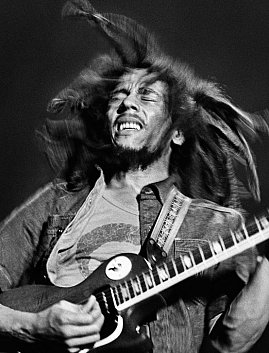
Of all the many historical figures in the 20th century regarded as forbearers of cultural revolution, Bob Marley is probably the most overlooked. While his unique brand of counterculture music and philosophy is certainly not forgotten (nor shall it ever be), a different set of associations with the man have long overshadowed the crux of what he stood for.
Coming from Jamaica, Marley grew up with a unique view of the world which Americans and Europeans do not usually share. Having seen the disparity of those who have much and those who have none, while also experiencing the “brotherly” sentiment which Jamaican culture paradoxically also values, it’s easy to say that he saw the harsh dichotomy of society more clearly at such a young age, than many others do in their entire lives.
Scholars have since compared his philosophies to those of Buddha, who had a similar message of peace, contentment and love for our fellow man. However, while this (along with the birth of a wonderful genre of music) was his greatest contribution and his greatest message, something went horribly wrong along the way.
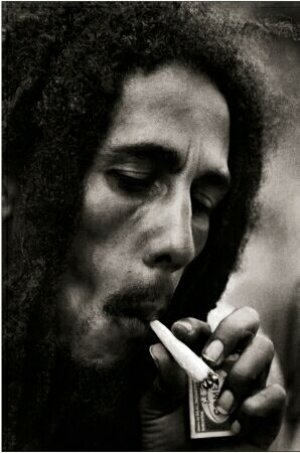 Unfortunately, more
people currently associate Marley’s message, image and music (as
well as Jamaica in general) with the marijuana movements which still
prevail.
Unfortunately, more
people currently associate Marley’s message, image and music (as
well as Jamaica in general) with the marijuana movements which still
prevail.
Now, there’s no need to take a stance on marijuana, its legalization and use and so forth, as society is very quickly deciding that for itself anyhow. Yet, this was but a tiny aspect of Marley’s life.
But marijuana was most certainly not the focus of his life, his music or his philosophy. Those whom have studied Rastafarianism closely, and have studied Marley’s life, his music and his writings, will understand this. Marijuana is part of this subculture, and it is a significant aspect, but it is not its focus. So how, then, did this happen?
While Marley’s music (and others in the genre later on) definitely gained quick popularity with the marijuana-smoking crowds, this direct association did not come along right away. Some suggest it was the result of licensing decisions he made near the end of his life. Agreeing to have his face put on marijuana paraphernalia, propaganda t-shirts and the like, while lucrative, may have “typecast” his message and music.
Marley and his fans already did have an unquestioned association with said drug use to begin with. This would have only served to cement that, not overemphasize it.
Instead, it’s more likely a far more heinous social pattern which can be blamed.
In truth, it does start with that initial, truthful association with marijuana, and the reaction most conservative society (especially parents) had to it. Combined with a still present resentment to people of color (segregation had only just ended in the United States), there was bound to be some social hostility aimed in Marley’s direction.
While his true message of pacifism and kindness itself certainly wouldn’t have alienated the society of that time, an openly pot-smoking Jamaican black man certainly could. This is a shameful fact, but one that must be acknowledged in order to move on. This animosity wasn’t any more severe, initially, than what Elvis Presley received for his provocative dancing on television or other groups had received for being “loud and disruptive”.
No, the real problem was to begin in an oddly more enlightened era.
In reality, the legal severity of possession of marijuana and paraphernalia did not begin to heighten until close to the end of Marley’s life in the Reagan Era. While on the books as illegal since the Thirties, the Seventies era “war on drugs” -- still moving full steam ahead to this day -- was when its illegality became a strong reality.
With the drug itself becoming a symbol of rebellion against elders and society, and Marley’s music having done just that previously, this association, once fairly minor, was reinforced. This was when merchandising choices were also made. In the Eighties, after Marley’s tragic passing, his image began to mutate more and more rapidly, the drug culture abducting his image and message and refocusing it entirely on the drug use itself.
With the advent of the internet in the mid-Nineties, this proliferation rate reached a new speed, and has yet to slow down. With bloggers, meme makers and other such content providers hammering out new ideas and twisted versions of old ones nearly 24 hours a day, the rate of decline of Marley’s image from an ambassador of a peace loving Caribbean culture who sought love and equality for all of mankind to that of a “pothead” who merely represented other potheads, was unstoppable.
One only needs to do a simple Google Images search of “Bob Marley” to see just how synonymous his name and image have become with marijuana use.
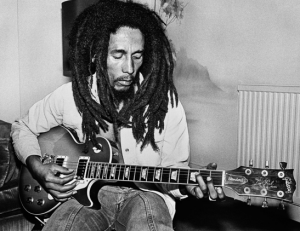 It’s
almost entirely a retrospective besmirching of his image, music and
philosophy.
It’s
almost entirely a retrospective besmirching of his image, music and
philosophy.
Sadly, while Marley would undoubtedly be happy to see the recent legalization of marijuana in Washington, Oregon and Colorado – when he saw what his message had been mutated into by misguided cannabis users, he would likely be quite upset at the focus being shifted away from his music.
Quite what he would have made of his widow Rita and children Cedella and Rohan late last year entering a licensing agreement with the private equity company Privateer Holdings (which specialises in marketing legal marijuana) to use his name on a marijuana blend entitled Marley Natural, we can only guess.
While Bob Marley did not invent reggae he’s the artist most often associated with it and credited with popularizing it and spreading it’s influence across all genres of music. Without Bob Marley, several flavors of Caribbean music may never have found their way out of those islands – at least not before the advent of the internet. Had he not been so vocal and popular, a modern day message of peace, understanding and brotherly love would not have taken some of the edge off of the terrifying social upheaval in the Sixties and Seventies.
Thus this, not perversion but misrepresentation of his message and music is damaging. It’s damaging to his legacy, his family and his true fans. But worse yet, it’s damaging to history.
Marley’s historical contributions to social revolutions, to music, to the accessibility of Jamaican culture by those from elsewhere is completely obscured by the fact that he and his colleagues enjoyed cannabis. Rather than regarding this as merely an interesting aspect of a much more interesting, brilliant and creative man with a stunningly beautiful message to share, he’s been relegated to a “pothead” icon.
Ultimately, all that can be done by those who appreciate his true message, and his music, is to just enlighten people to its true meaning. Combating the drug culture gets everyone absolutely nowhere. Let them have their gifts from Bob Marley too, just … let’s share him with the rest of the world too – the real Bob Marley.
For now, we can all always look forward to catching our favorite Marley tune on the radio, and relaxing to it on the bus or in the car coming from a hard day’s work. As the tension of the workaday lifestyle get to be their worst, we can appreciate his “chill out and just let things happen” attitude.
His legacy in music is now carried on by his son, Ziggy Marley. Ziggy has achieved his own status as a celebrated artist and, for those interested, has been profiled on DirecTV’s Guitar Center Sessions where he discusses his childhood and relationship with his father, who encouraged his interest in music as a form of expression.
While Bob is no longer with us, his legacy lives on.
His passion for music, activism, and a revolution towards love still continues to this day.
While the younger generations may not even know it, so many of them and their favorite artists are still carrying the torch of change that Marley first lit back in the Sixties, and for that he’ll never be forgotten.
Jared Hill is a New Zealand music writer.
Other Voices Other Rooms is an opportunity for Elsewhere readers to contribute their ideas, passions, interests and opinions about whatever takes their fancy. Elsewhere welcomes travel stories, think pieces, essays about readers' research or hobbies etc etc. Nail it in 1000 words of fewer and contact graham.reid@elsewhere.co.nz.
See here for previous contributors' work. It is wide-ranging.



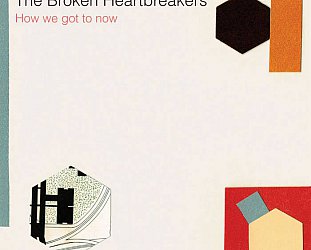
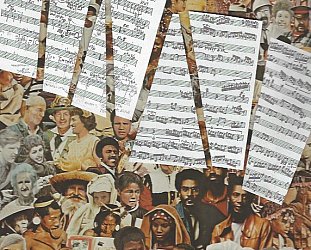
post a comment